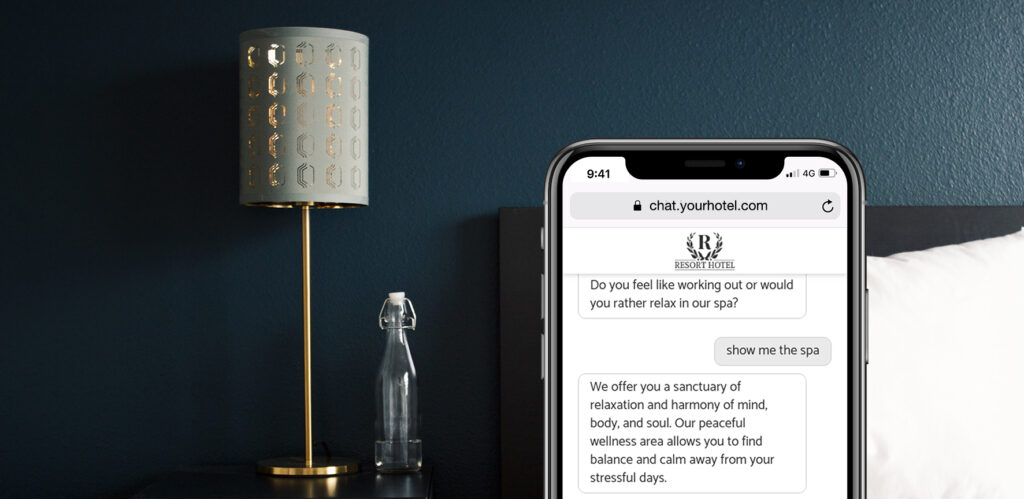What are the advantages of using chatbots in hotels?
Using chatbots in hotels can have many advantages. The younger generation grew up with messaging apps and communicates via these medias on a daily basis. By offering this type of online interaction to your guests, in addition to the traditional communication channels like telephone and email, it is also ensured that the demands and needs of the young and digitally savvy target group are met.
Another significant advantage of chat communication is its low-threshold: Many guests consider making phone calls or writing emails as too much effort. The chat enables an easy and uncomplicated way of getting in contact with the hotel.
Ultimately, chat communication in hotels is efficient because it can be easily automated: The texts in a chat are very short, and AI can be used perfectly for this purpose. This way frequently asked questions, such as “How much does parking cost”, “Are dogs allowed in the hotel?” or “Can I have a baby bed in my room?” can be answered in only a matter of seconds.
The result is a win-win situation: The guests are pleased as they receive a quick answer to their question, and the workload of the employees is reduced since they no longer need to personally take care of every inquiry.
Our chatbot ensures an automation rate of 90 percent. In times of personnel shortage, the staff is very grateful if they only need to respond to one out of 10 guest inquiries, and the chatbot handles the rest.
But: What if the chatbot cannot come up with an answer?
In case the chatbot cannot answer the question of a guest, it simply creates a hand-over-to-human: This means that the hotel receives a notification, and an employee then enters the live chat with the guest and takes over.
How can hotels ensure that their chatbots are always up-to-date, and make sure that they provide guests with the latest information?
The hotels can make adjustments in the backend of the DialogShift chatbot. It is possible to edit already existing answers to standard questions or add new questions and their respective answers.
Where does the guest get into contact with the chatbot?
The chatbot is offered at various points throughout the guest journey. The potential guest can find the chatbot on Google as well as on the hotel’s website, this allows him or her to get more detailed information regarding the location but also to start the booking process. After all, on average 60 to 80 percent of all questions that are asked to the chatbot on the hotel website concern booking. Further touchpoints where the guest can make use of the chatbot are popular messaging apps for private use, such as WhatsApp, but also social media platforms like Instagram and Facebook. In the hotel, guests can access the chatbot via the guest app or by using QR codes which will directly lead them to a WhatsApp chat which they can also later rejoin at any time if they have further questions.
Guests can get information about the offerings in and around the hotel, enquire about excursion sites in the area and even make restaurant reservations.
How does the chatbot overcome language barriers?
The system is multilingual; via a connection to Google Translate a real-time translation into 109 languages is issued. This does not only work in the automized chatbot but also in the live chat.
What does a hotelier need to consider to make the usage of the chatbot successful?
The online presence is of very high importance: If I can provide a well-functioning website with high access rates, can easily be found on Google, and am also active on social media platforms like Instagram and Facebook, my chatbot will be used frequently on these channels.
It is also important that guests can easily access the chatbot in the hotel. The best way to do this is by attaching the already mentioned QR-codes to highly frequented locations. When the guests scan the QR codes, they are immediately forwarded to the WhatsApp chat.
One of the goals of working with chatbots should also be to reduce the employee’s workload and relieve them from taking care of communication. This is why it is important that the automation rate of the product should be as high as possible. As already mentioned above, the solutions offered by DialogShift have an automation rate of 90 percent.

How does the interface between hotelkit and the DialogShift chatbot work?
By using this efficient interface, the employees receive a notification directly in hotelkit whenever a guest has entered the live chat. This guarantees that the guests are provided with answers promptly.
Right now ChatGPT is on everyone’s lips. Could this AI also be used in hotels?
It is true that ChatGPT is a new milestone when it comes to AI. A chatbot that can provide human-like answers, can generate coherent texts and seems to know an answer to almost anything. However, this also poses a big problem with this AI: It seems to know everything, but if it does not know the answer, it lies convincingly. This is something that simply cannot happen in the Customer Service of a hotel. This area requires consistent and accurate answers – and rightly so! What is interesting for hotel chatbots like ours is the Large Language Model on which ChatGPT is based as it enables AI to produce human-like texts. We are currently working on incorporating this model into the DialogShift solutions via an integration to GPT3.
If you not only want to provide your guests with quick answers, but also want to ensure time-efficient and transparent digital communication in your team – hotelkit is the ideal solution.
About DialogShift
DialogShift’s chatbot solutions are based on artificial intelligence and reduce the workload of hotel staff, enable bookings and automatically respond to guest inquiries around the clock in 109 languages and at various contact points during the guest journey, such as the hotel’s website, Google, WhatsApp, Facebook, Instagram or within the guest app. If necessary, the chatbot forwards the client to a live chat where he/she can get in contact with a hotel employee. An automation rate of 90 % guarantees that 9 out of 10 inquiries are answered automatically by the chat.
DialogShift has already received several awards for its hotel application, amongst others Industry Award presented by the German Hotel Association (IHA) in 2021 and Best Travel Technology Award granted by Travel Industry Club in 2020.

About the author
Michael Santner
Narratives about impoverished poets during his studies encouraged him to follow his passion in a secure job. In hotelkits marketing he takes care of packing the numerous ideas of his colleagues into exciting stories.





